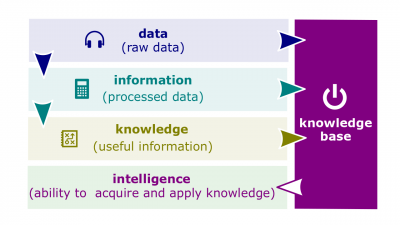Difference between revisions of "Knowledge"
(→Related coursework) |
|||
| (One intermediate revision by the same user not shown) | |||
| Line 3: | Line 3: | ||
#The theoretical or practical understanding of a subject; | #The theoretical or practical understanding of a subject; | ||
#Awareness or familiarity gained by experience of a fact or situation. | #Awareness or familiarity gained by experience of a fact or situation. | ||
| + | |||
| + | ==Definitions== | ||
| + | According to the [[Corporate Strategy by Lynch (4th edition)]], | ||
| + | :[[Knowledge]]. A fluid mix of framed experience, values, contextual information and expert insight. It accumulates over time and shapes the organization's ability to survive and compete in markets. Note that knowledge is not 'data' or 'information'. | ||
==Related lectures== | ==Related lectures== | ||
*[[Concept Management Quarter]]. | *[[Concept Management Quarter]]. | ||
| − | [[Category: Septem Artes Administrativi]][[Category: Articles]] | + | [[Category: Septem Artes Administrativi]][[Category: Articles]][[Category: Strategic Management]] |
Latest revision as of 10:08, 11 July 2020
Knowledge is one of the following:
- Facts, information, and skills acquired by a legal entity through experience or learning;
- The theoretical or practical understanding of a subject;
- Awareness or familiarity gained by experience of a fact or situation.
Definitions
According to the Corporate Strategy by Lynch (4th edition),
- Knowledge. A fluid mix of framed experience, values, contextual information and expert insight. It accumulates over time and shapes the organization's ability to survive and compete in markets. Note that knowledge is not 'data' or 'information'.
